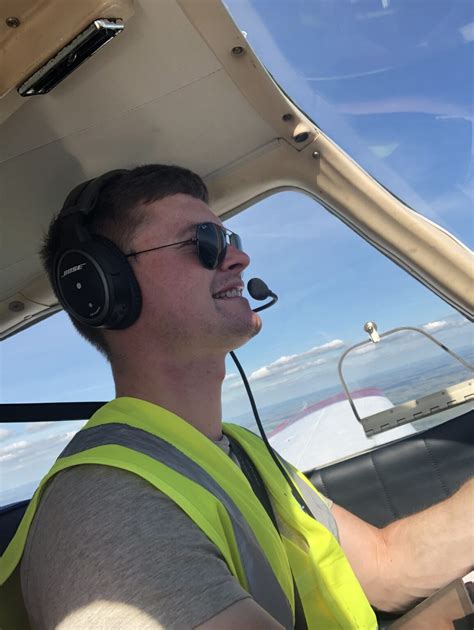Are you an aviation enthusiast dreaming of soaring through the skies as a commercial pilot? Becoming a commercial pilot is an exciting and rewarding journey that requires dedication, perseverance, and a passion for aviation. In this blog post, we will explore the necessary steps and essential information for aspiring commercial pilots. From understanding the role of a commercial pilot to navigating through aviation regulations, preparing for flight examinations, and exploring career opportunities, we will cover everything you need to know to kickstart your career in the aviation industry. Whether you are a high school student considering a future in aviation, a college graduate looking to pursue a career change, or simply someone with a deep love for flying, this guide will provide you with valuable insights and guidance on how to navigate the skies and become a successful commercial pilot. Join us as we embark on this exhilarating journey towards achieving your dreams of flying professionally.
Table of Contents
Understanding the Role of a Commercial Pilot
Being a commercial pilot is a highly demanding and rewarding profession that requires a high level of skill, responsibility, and dedication. From flying passengers to transporting cargo, commercial pilots play a crucial role in the aviation industry. Their primary responsibility is to safely operate aircraft and ensure the safety of all passengers and crew on board.
Commercial pilots undergo extensive training and education to acquire the necessary skills and knowledge to handle various aircraft and scenarios. They must obtain a commercial pilot’s license, which requires a minimum number of flight hours and passing written and practical exams to demonstrate their proficiency.
In addition to mastering the technical aspects of flying, commercial pilots also need to possess strong decision-making and problem-solving skills. They must be able to think quickly and adapt to changing situations, especially during adverse weather conditions or in emergency situations.
Furthermore, commercial pilots must adhere to strict aviation regulations and safety protocols to maintain the highest level of professionalism and safety in the air. This includes conducting pre-flight inspections, following air traffic control instructions, and continuously monitoring the aircraft’s performance during flight.
Required Education and Training
For those who aspire to become a commercial pilot, it is essential to understand the required education and training. Aspiring pilots must possess a high school diploma or equivalent, as well as a commercial pilot’s license from the Federal Aviation Administration (FAA).
In addition to the basic education requirements, aspiring pilots must also complete specific training programs through a certified flight school or aviation academy. These programs typically include both ground and flight training, covering essential topics such as aircraft operation, navigation, and emergency procedures.
Furthermore, aspiring pilots are also required to accumulate a certain number of flight hours to qualify for their commercial pilot’s license. This requirement ensures that pilots have the necessary experience and proficiency to safely operate aircraft in various conditions.
Overall, the required education and training for aspiring commercial pilots is a combination of formal education, specialized training, and hands-on experience, all of which are crucial for mastering the essential pilot skills and navigating through aviation regulations.
Choosing the Right Flight School
When it comes to pursuing a career as a commercial pilot, one of the most crucial decisions you will have to make is choosing the right flight school. This decision can have a significant impact on shaping your future as a pilot, so it is essential to carefully consider your options and make an informed choice.
First and foremost, you should research and evaluate the flight training programs offered by various flight schools. Look into the curriculum, training facilities, and aircraft fleet. It is important to ensure that the school provides a well-rounded education and hands-on experience in various flying conditions.
Additionally, consider the instructor-to-student ratio at the flight school. Personalized attention and guidance from experienced instructors can make a substantial difference in your learning experience. Look for schools that prioritize individualized training and mentorship.
Lastly, take into account the reputation and accreditation of the flight school. Look for schools that are internationally recognized and have a proven track record of producing successful pilots. Consider reaching out to current students and alumni to get their firsthand feedback on their experiences at the school.
Gaining Flight Experience
As a commercial pilot, gaining flight experience is a crucial aspect of your career. The more time you spend in the air, the more confident and competent you become as a pilot. This experience is not only valuable for your own skill development, but it also enhances your credibility and employability in the industry.
One of the most common ways for pilots to gain flight experience is by working as a flight instructor. This role allows you to share your knowledge and expertise with aspiring pilots while logging valuable flight hours. It also provides an opportunity to refine your own skills and stay up-to-date with the latest training techniques and technologies.
Additionally, many pilots choose to gain flight experience by working for charter companies or regional airlines. These positions often involve flying smaller aircraft and operating in various weather and airspace conditions, which can be invaluable for building a well-rounded skill set as a pilot.
Another important aspect of gaining flight experience is to actively seek out opportunities for multi-engine and instrument-rated flying. These additional ratings and experiences not only make you a more versatile and capable pilot but also open up more opportunities for employment in the future.
Mastering the Essential Pilot Skills
Mastering the essential pilot skills is crucial for any aspiring commercial pilot. These skills are the foundation of a successful career in aviation, as they form the basis of safe and efficient flight operations. From mastering aircraft control to understanding navigation systems, there are a range of skills that pilots must develop and perfect in order to operate an aircraft safely and effectively.
One of the most important skills for a pilot to master is aircraft control. This involves understanding how to handle and maneuver the aircraft in various flight conditions, including takeoff, landing, and in-flight operations. Pilots must also be proficient in managing the aircraft’s systems and responding to emergencies, such as engine failures or adverse weather conditions.
Another essential skill for pilots is navigation. Pilots must be able to interpret and use navigation charts, instruments, and technology to determine their position and course during flight. This includes understanding how to use GPS systems, radio navigation aids, and other tools to navigate safely and accurately.
In addition to aircraft control and navigation, pilots must also master communication and decision-making skills. Clear and effective communication is critical in aviation, as pilots must be able to communicate with air traffic control and other aircraft to maintain safe and efficient operations. Furthermore, pilots must be able to make quick and accurate decisions in high-pressure situations, such as during emergencies or unexpected changes in flight conditions.
Navigating through Aviation Regulations
As a commercial pilot, understanding and navigating through aviation regulations is an essential part of your job. These regulations are put in place to ensure the safety and efficiency of air travel, and it is crucial for every pilot to be well-versed in them.
One of the key aspects of navigating through aviation regulations is staying up to date with the latest changes and updates. The Federal Aviation Administration (FAA) is responsible for regulating air travel in the United States, and they frequently issue new regulations and guidelines. Pilots must be diligent in keeping abreast of these changes and understanding how they affect their day-to-day operations.
Another important factor in navigating through aviation regulations is understanding the different types of airspace and their respective rules. Airspace is divided into different classes, and each class has its own set of regulations regarding things like minimum safe altitudes, weather minimums, and communication requirements. Pilots must be familiar with these regulations in order to safely navigate through different types of airspace.
Furthermore, pilots must also adhere to specific regulations when it comes to flight operations, including rules for takeoff and landing, aircraft maintenance and inspections, and pilot licensing and certification. It’s imperative for pilots to have a comprehensive understanding of these regulations in order to operate safely and legally.
Preparing for Flight Examinations
Preparing for flight examinations is a crucial step in becoming a successful commercial pilot. The examinations are designed to test your knowledge, skills, and ability to handle different flight situations. It’s essential to start preparing well in advance to ensure that you are fully prepared and confident on the day of the exam.
One of the key preparation steps is to thoroughly review the study materials provided by your flight school or training program. This includes textbooks, manuals, and any additional resources recommended by your instructors. Understanding the theoretical concepts is just as important as practical skills, so dedicate ample time to study and revision.
Another important aspect of preparing for flight examinations is to regularly practice and review your flight maneuvers. This includes mastering take-offs, landings, navigation, emergency procedures, and instrument flying. It’s important to seek feedback from your flight instructors and make necessary improvements in your performance.
Lastly, mental preparation is crucial for success in flight examinations. Visualize yourself successfully completing each segment of the exam and have confidence in your abilities. Stay focused, manage any test anxiety, and maintain a positive attitude throughout the examination process.
Building a Pilot Network
Building a strong pilot network is essential for anyone aspiring to have a successful career in aviation. Whether you are a newly licensed pilot or someone with years of experience, having a network of fellow pilots, industry professionals, and aviation enthusiasts can open up countless opportunities for career growth and personal development.
One of the best ways to start building your pilot network is by joining aviation organizations and associations. These groups often host networking events, workshops, and seminars that allow you to connect with other pilots and industry leaders. Additionally, they provide valuable resources and information that can help you stay updated on the latest trends and developments in the aviation industry.
Another effective way to expand your pilot network is by attending airshows, conferences, and fly-ins. These events bring together pilots from all over the world, providing the perfect opportunity to meet new people, exchange ideas, and build lasting relationships. Whether you are looking for mentorship, job opportunities, or simply want to connect with like-minded individuals, these gatherings can be incredibly beneficial.
Furthermore, leveraging social media platforms and online forums can also help you grow your pilot network. Joining aviation groups on platforms like LinkedIn, Facebook, and Twitter can connect you with a global community of pilots and aviation professionals. Engaging in discussions, sharing your experiences, and offering support to others can help you establish a strong online presence within the aviation community.
Exploring Career Opportunities
As a commercial pilot, there are a wide range of career opportunities available to you. Whether you dream of flying for a major airline, working as a charter pilot, or even becoming a flight instructor, the options are virtually endless.
One common career path is to start as a first officer with a regional airline and work your way up to a captain position. This can lead to opportunities to fly larger, more advanced aircraft on international routes.
Other pilots may choose to work in the corporate or charter sector. These positions often offer more flexible schedules and the ability to fly to a wide range of destinations.
For those with a passion for teaching, becoming a flight instructor can be a rewarding career choice. This allows you to share your knowledge and passion for flying with the next generation of pilots.
Maintaining Professionalism and Safety in the Air
When it comes to the aviation industry, maintaining professionalism and ensuring safety in the air are of utmost importance. Whether you are a commercial pilot or a private pilot, it is crucial to adhere to strict guidelines and regulations to keep yourself and others safe. Professionalism goes hand in hand with safety, as a professional pilot is expected to prioritize the well-being of their passengers and crew at all times.
As a pilot, one must constantly be aware of their surroundings and make quick decisions to ensure the safety of the flight. This includes proper communication with air traffic control, monitoring weather conditions, and performing thorough pre-flight checks. Additionally, adherence to proper cockpit procedures and protocols is essential in maintaining a safe and professional flying environment.
Continuous training and education are also key factors in maintaining professionalism and safety in the air. Pilots should stay updated on the latest developments in aviation technology and regulations, as well as participate in regular safety training courses to enhance their skills and knowledge. By staying informed and well-trained, pilots can effectively mitigate potential risks and maintain a high standard of safety.
Furthermore, it is imperative for pilots to adopt a responsible and ethical approach to their profession. This encompasses making sound decisions, upholding honesty and integrity, and being accountable for one’s actions. Professionalism and safety in the air are not just about technical expertise, but also about displaying a conscientious and principled attitude towards flying.






